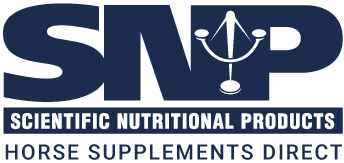With the weather feeling decidedly more autumnal and the rain showers increasing many horse owners are considering the risk of Laminitis for their horse or pony. The word laminitis strikes fear into the heart of any horse owner as the all too common condition leads to debilitating welfare problems and acute lameness in many cases. So in our latest blog Scientific Nutritional Products takes a look at how to avoid and manage equine laminitis.
The term Laminitis, describes the process of the laminae tissue found in the hoof of the horse becoming inflamed. This inflammation results in pain and lameness and can lead to tears of the internal tissue bond between the dermal and epidermal laminae. In serious cases of laminitis this tearing of the laminae can lead to the rotation of the pedal bone.
What do we know about the condition?
Laminitis is caused by a number of factors including; toxaemia, hormone imbalances, trauma, stress but one of the major factors can be improper nutrition, namely overfeeding.
Many leading experts recommend that in order to try and prevent the condition the amount of sugars in the diet should be reduced. This can include a reduction in concentration feed, reduced exposure to lush pasture or soaking your hay to lower the starch and sugar levels within it.
Utilising correct body condition scoring can also help horse owners determine our horse’s weight, and whether they food consumption is correct for their type and their workload. It is important to remember the problems general arise when the ingestion of pasture and feed is combined with a lack of exercise.
If your equine is at risk-what should you do?
It is important to know what you are looking for. In simple terms, if your horse is overweight and carrying too much condition and undertaking limited exercise they are more at risk.
Five Top Tips from Scientific Nutritional Products if your equine is at risk
- Restrict your horse’s concentrate feed quantities and seek out a high fibre, low sugar, low starch alternative such as soaked hay. Always feed your horse in relation to their workload- remember your equine only needs calories they are going to utilise!
- If you are reducing the level of concentrate feed it is important to ensure your horse or pony is still receiving the vitamins and minerals they require in the diet. Technically a horse suffering from Laminitis is not a ‘healthy’ animal so despite needing to reduce the calorie content of the diet it is vital they are not left without the nutrients they need.
- Limit your equine’s pasture time or if he is happier in the field restrict the area they have access to with temporary fencing or by using a grazing muzzle.
- Choose wisely about when you turn your horse out to graze. Studies have found that the risk of laminitis can be increased when horses are turned out on pasture which has been exposed to cold nights and sunny weather during the morning.
- Always maintain a regular exercise routine and consider adding a vitamin and mineral supplement to the diet if you are concerned about reducing feed quantities such as Horse & Pony Multivitamin Supplement from Scientific Nutritional Products.
Vitamins and minerals are vital to health and well being and alongside ample low calorie forage such as soaked hay a vitamin and mineral supplement such as Horse & Pony Multi-vitamin supplement can be helpful in cases of laminitis or to maintain a healthy diet for those equines requiring low levels of feed to ensure a balanced diet.
This equine supplement includes over 25 essential vitamins and minerals promoting optimum health for all horses and supporting those such as laminitics on low levels of concentrate feeds.
If your horse or pony’s feet are in poor condition as a result of Laminitis then feeding a Biotin Hoof supplement is recommended. Robust Hoof contains essential Biotin, Methionine, Lysine, MSM and Bioplex minerals to promote healthy hoof growth.
For more information about Horse & Pony Multivitamin and Robust Hoof Supplements visit the website www.horsesupplementsdirect.co.uk or Tel: 01377 254900 and don’t forget to check in with our educational blog next week!


